#and character analyses
Explore tagged Tumblr posts
Text
most funniest sudden deviation from a youtuber’s typical video lineup i’ve seen in recent memory

like bro imagine being SO pissed at the direction a show had taken that you have to momentarily quit spongeposting in order to talk about it for two whole hours. king shit
#pinyatalk#yes. ALL her content is spongebob. except for just that ONE video.#even tho i never watched arcane season 2 (i heard some Things about it that made me turn away from it lol) that essay was still utter PEAK#REALLY good political analysis and critique of themes and characters and such. GOD. plz watch itttt#she may be a spongepilled squarepantsmaxxer but she talks about this shit like she’s known it for yearsss#i haven’t watched the spongebob analyses yet tho. though if the arcane video was peak then all her spongebob stuff must be peak as well…#anyways here’s the videooo (https://www.youtube.com/watch?v=qAgP6V--qYM)
31K notes
·
View notes
Text
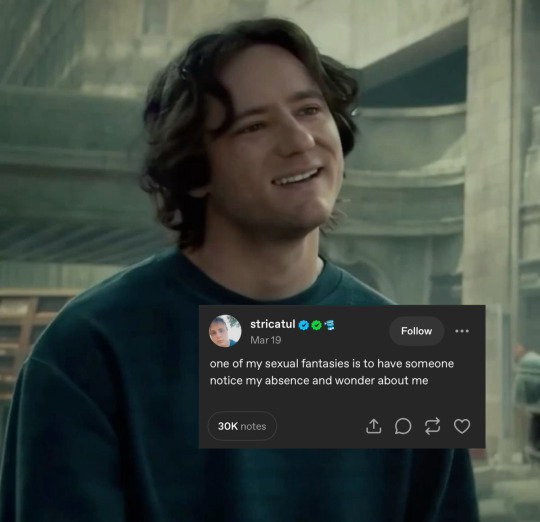
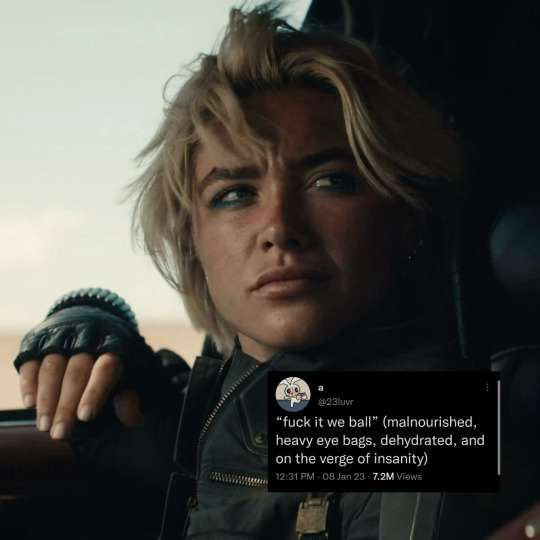
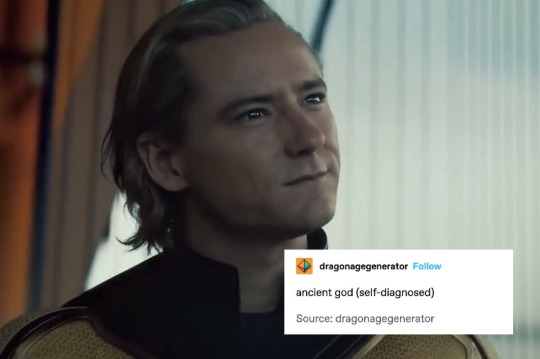
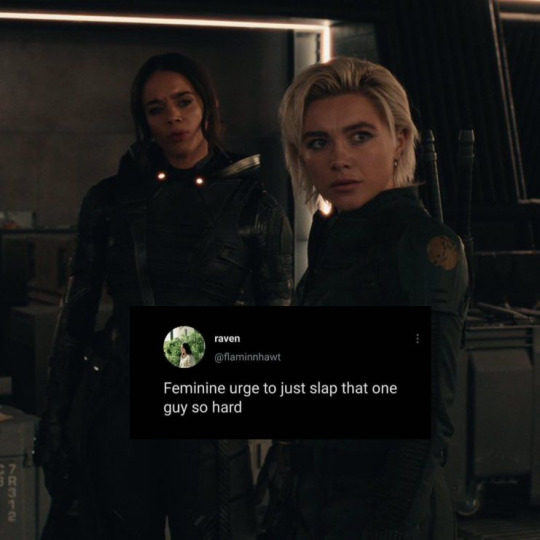
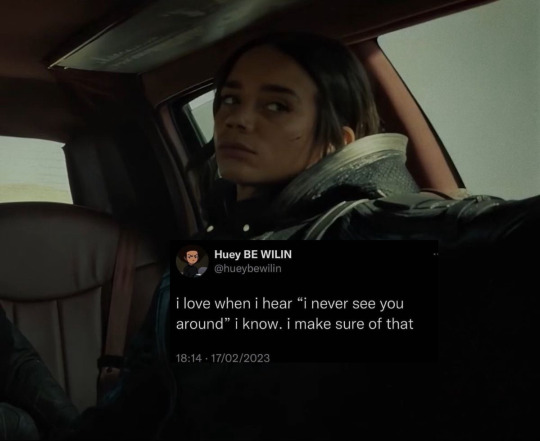
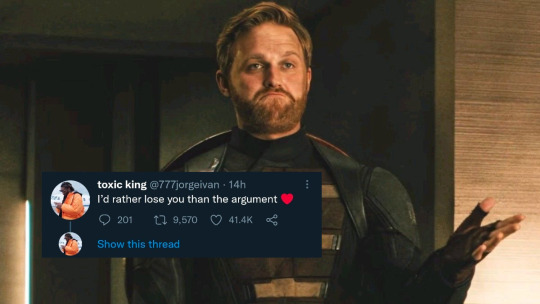

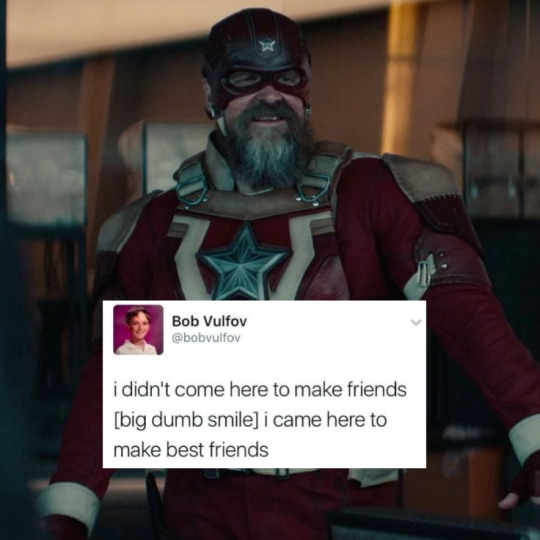
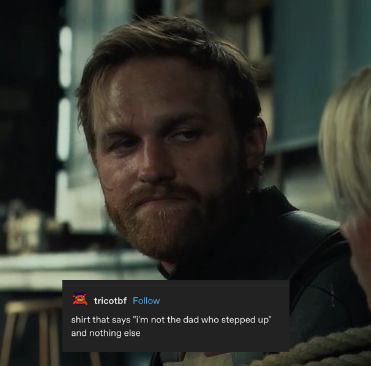
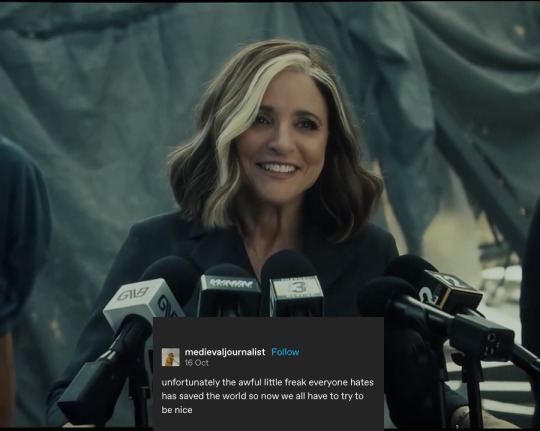
Actively spinning them in my head on a carousel and inserting more quarters till the machine breaks
#I’m so casual about them#haha really totally#*hides my seven page character analyses and headcanons behind my back#they are everything to me#and i’m not sorry#thunderbolts#marvel#thunderbolts*#the new avengers#bob reynolds#yelena belova#ava starr#john walker#alexei shostakov#bucky barnes#valentina allegra de fontaine
3K notes
·
View notes
Text
“you never would you coward. (would you…?)”
the master getting teary eyed and scared when he realises the doctor is really considering to pull the trigger but still daring him to do it. He needs to know, he needs to see if the doctor is capable of it. is he? would he really? why is he still pointing the gun at him?
“go on then. do it.”
But he doesn’t want to die. you can hear it in his voice and see it in his face but he needs to know how far the doctor is willing to go. And besides he’s the master. He’s not gonna back down and plead. At least not in this regeneration. the subtle and terrorised headshake after works very well as there’s one part of the script missing in this scene

“don’t.”
and the doctor won’t.
#ahah. im normal.#you need to know this was the scene that made me look for the name of the ship#I already liked thoschei but not at the level to look for fanworks yet this was a gamechanger#I should analyse thoschei scenes more often instead of keeping it all in my head#scene analysis#I guess#does this count as#character analysis#idk#tensimm#thoschei#doctor who#the master#best enemies#simm master#the end of time#doctor/master#me being annoying about the master tag
606 notes
·
View notes
Text
there's meta to be had about just how much of viktor's arc is about loneliness and the blatant visuals they use in his evolution about metamorphosis, butterflies, cocoons, in utero, etc, as he molts from a soft, vulnerable larva who keeps getting hurt in his bids for love and acceptance, into a hardened final form complete with an exoskeleton acting as both physical and emotional armor. a shield keeping his emotions in and the pain of loneliness and rejection out, until it's cracked and his humanity is forcefully exposed. like. sorry if it's just the entomologist in me but this was blatantly obvious the very first time i watched the show and I've been continually surprised that no one's really pointed this out. as a certified lonely person it struck such a deep cord with me, when he accepted his fate, his path ahead, to be one he'd have to walk alone, finally putting up that last seemingly impenetrable wall around his soft parts (but keeping the blanket, this signal that he never asked for this, and that he's not unreachable). So much of his s2 arc centered around not just his desire to right his wrongs and help the world, but to connect with others and not feel alone, both of which got twisted by the hexcore. His attempt to create a hivemind where no one would ever suffer loneliness or rejection or loss, and he would feel their souls with him as well (even though that was an illusion in the end, he truly believed it). The whole 'I now speak with all their voices' but he's just floating in an empty space. And for the consequence of the glorious evolution to be eternal solitude, it just drives home how that's the worst possible fate imaginable for Viktor.
#arcane#viktor arcane#jayvik#arcane meta#look i barely post analyses but i've been on a roll lately and i just wanna say i'm theorizing CONSTANTLY. i havent stopped for three month#i just havent posted it.#anyway i felt the need to say this one even in rough form because it's. such powerful imagery they use and yet barely anyone talks about it#given esp the canonical butterfly motifs used over and over and over#viktor's so fucking alone in the last year of his life. he shrinks in on himself. he's deeply hurt. getting rejected in the council room wa#like IT for him. the defeat when he finally gives up and gives in.#i just. bro. this is a big part of why i identify so strongly with viktor as a character because it's so much about his loneliness#i may clean this up and post an actual meta about it if i feel like it. this is really one of the most important parts of his arc imo#mage viktor leaving jayce down in that ravine. watching him but not intervening. in a way forcing jayce to experience his loneliness#idk how you watch that scene with The Line and Viktor standing alone after hex-Sky disappears and not get a knife through the heart#at feeling his utter soul-crushing loneliness#he's now alone in the astral plane. no one could understand him before because of what made him different#now he's alone again. no one can perceive him how he actually is. again and again no one sees him for who he is
601 notes
·
View notes
Text
It’s been clear that the Tanizakis aren’t siblings from the very beginning
here’s some evidence now that it’s been confirmed canon…
everyone who’s read irl Tanizaki’s book knew that Junichiro & Naomi weren’t siblings as soon as they introduced themselves

BUT just because the Tanizakis aren’t siblings doesn’t mean you can’t feel uncomfortable about them. if you feel uncomfortable, GOOD. that’s exactly what they want
the Tanizakis, Mori— they all use these disturbing ruses to disarm or distract people in order to protect themselves, or to accomplish their goals. this is a writing device that asagiri commonly employs as a way to parallel the irl literature (it’s actually ingenious)
there are 4 main indicators that have always made it clear to me that Junichiro & Naomi are not siblings:
1. most obviously— their character designs. Harukawa is extremely intentional with character designs, & she very intentionally made Naomi & Junichiro look nothing alike
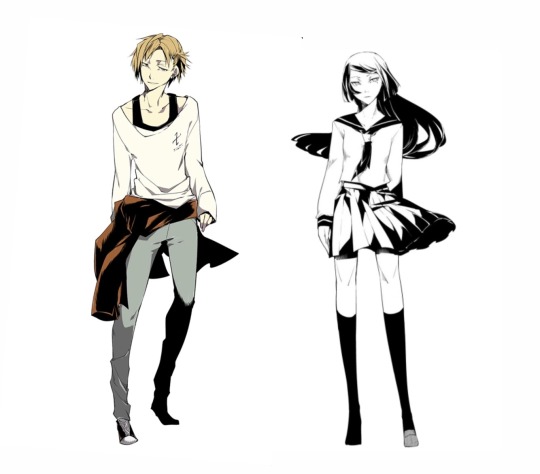
their eye shapes are purposely different
their color palettes are contrasting
even their differing styles of clothing have meaning
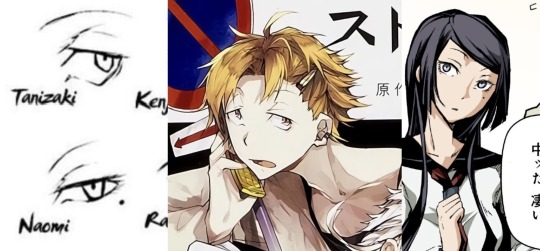
this was all done so that the audience could PLAINLY see that they’re not related— so that WE know that they’re lying when they say they ARE related
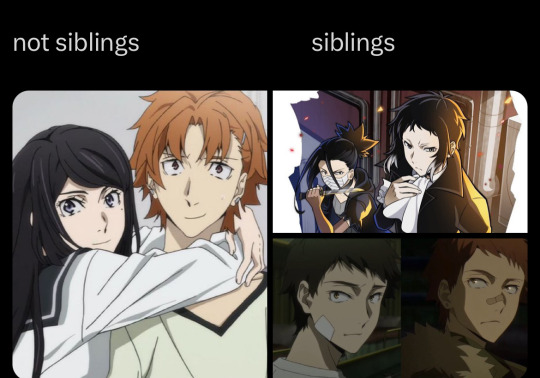
2. how the people around them respond to their act.
the general reaction is “don’t question it”— which is exactly what they want. “be distracted by how uncomfortable you feel so that you look away from what we’re hiding” (this is likely a protective measure)
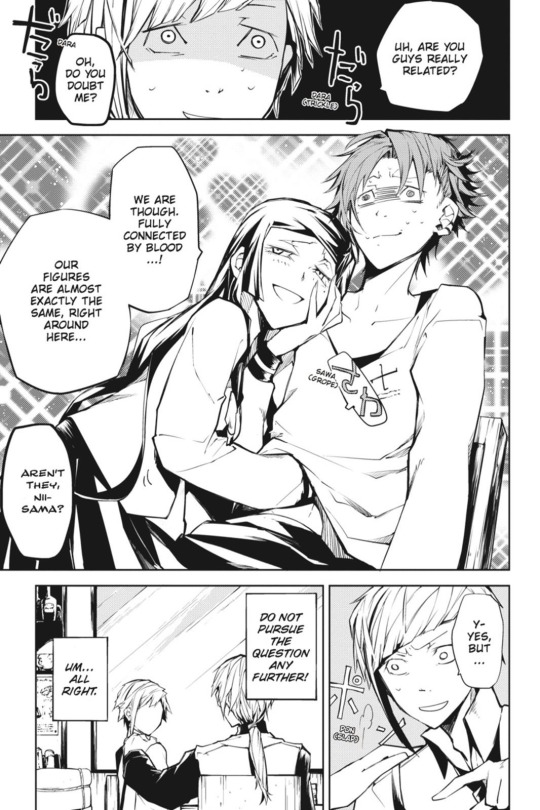
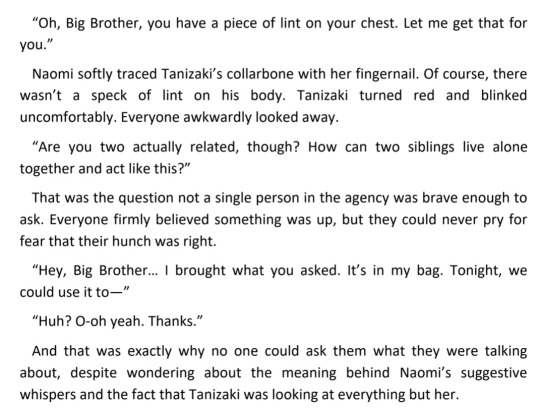
3. most importantly, this is meant to parallel irl Tanizaki’s book “Naomi,” where the main character Joji picks up Naomi to raise her into his ideal woman, but since she's so young (& a minor) they call each other cousins (Joji makes no sexual advances on young Naomi btw)
however, his plan backfires because when Naomi gets older & they get married, she flips the script on him & manipulates HIM so that he's under her thumb (which is why bsd Tanizaki is at a domineering Naomi's mercy). Joji let her have her way because of his masochistic tendencies
4. lastly is the emphasis that Asagiri and the Tanizakis themselves put on calling each other siblings.
over & over, it’s “my brother this” & “my sister that”
like they’re desperately trying to convince us that it’s true (“don’t let your lying eyes deceive you”)
here are just a few of many examples from the light novels…
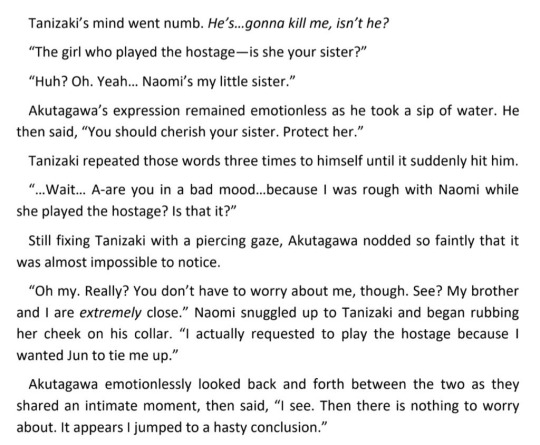

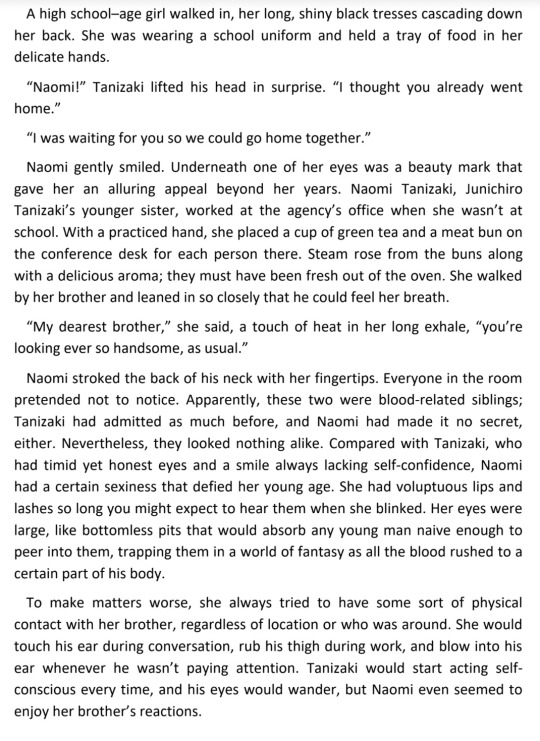
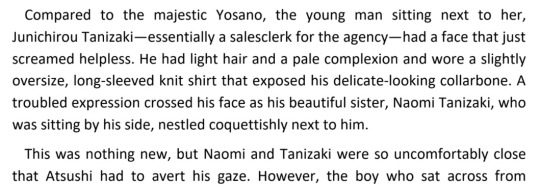
again, if you’ve read “Naomi” you knew that Junichiro & Naomi weren’t siblings as soon as they introduced themselves
just like if you’ve read irl Mori’s works, it’s clear that bsd Mori isn’t a pedophile
just like if you’ve read No Longer Human you know that Dazai’s an unreliable narrator. he makes you think he’s a bad person bc he believes he’s a bad person, but those around him see him differently (btw this doesn’t mean he’s never done anything “bad,” though bsd isn’t about morality— but that’s another discussion)
anyway, i’m so excited for the Tanizakis backstory to be revealed so that we can better understand why they use this defense!!
also let this be a reminder to READ THE LITERATURE if you’re able to!! even reading synopses & analyses of the coordinating books makes bsd make much more sense 🥹
reminder that this how you’re supposed to react while reading bsd:
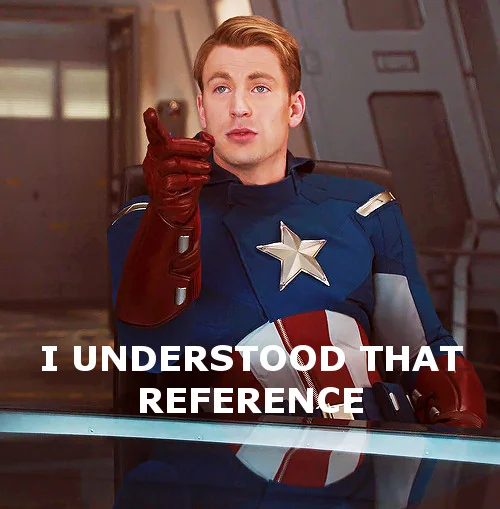
also, if you’re interested in a post explaining how Mori isn’t a pedo, i wrote this analysis on twt. OR you can read this document that one of my moots sent me (remember: analyzing a character does NOT mean you condone any actions they may or may not commit!)
#i hope this makes sense. i’ve had this in the drafts for months but was too scared to post it#i’m hoping now that it’s confirmed canon there won’t be as much backlash ^^’ pls be kind#darcy this is for you… i hope you like it :’)#also full disclosure i haven’t been able to read all of Naomi yet. mostly synopses & analyses. so don’t take my summary of the book as law#also hopefully now people won’t ignore the Tanizakis anymore!! not only are they so interesting. they’re also just fun characters#Naomi is so underrated & intelligent. i need more of her teaming up with Dazai#rambling about bsd again#bsd#bungou stray dogs#bsd meta#bsd analysis#bsd tanizaki#bsd naomi#naomi tanizaki#tanizaki junichirou#tanizaki siblings#bsd 118
1K notes
·
View notes
Text
i still can't believe that tweet about taylor needing to release a 9 track album is real. our attention spans are royally cooked
#if an album is long you're not obligated to listen to it all in one sitting#you can digest it in parts to fully appreciate the work#i get social media puts intense pressure on us to consume media as quickly as possible so that we can be the first to post fan art or edits#or fanfic or character analyses#but that doesn't mean long form media in itself is inherently bad it's how you decide to consume the content that makes you burnt out
234 notes
·
View notes
Text
i need to think about AMC Armand for a minute. About his passivity. I find it frustrating as a viewer, but I’m also deeply compelled by it. His most infuriating trait is what makes him so interesting. When he says “I could not prevent it,” I don’t think that he sees that as a lie. It’s not the truth, but I think he believes it. He’s so powerful and could at so many points take agency in the narrative, yet he chooses inaction. He lets Lestat destroy the cult, lets the Paris coven hold the trial, lets Louis kill them after, lets Daniel uncover the truth. He accepts whatever happens to him and makes it his life regardless of whether or not it’s what he wanted.
Claudia is a foil to this nature. She’s not the most powerful, but she always takes an active role in her own story. She makes her own choices even when they put her at risk. It’s why I don’t think the two of them ever could have gotten along; their natures are inherently opposed to one another. Even their similarities drive them apart—they both hate the reflections of themselves that they see in one another because of how their mirror reacts to trauma.
#this is long and rambly cause I’m literally just musing to myself about them. it’s crazy when they’re ur two favourite characters lmao#i empathize a lot more with Claudia because react the same way—I hate accepting injustice and letting life happen around me#amc iwtv#interview with the vampire#(also I’m always paranoid about posting character analyses cause I feel like ppl will tell me I interpreted it wrong and call me stupid lol)
331 notes
·
View notes
Text
so tired of engaging with fandoms recently, it's just not fun anymore. rlly sick of hearing shit like "if u like them, you must condone their actions!!1!1" and people adopting a mob mentality and attacking you for showing a fictional character an ounce of admiration or perhaps even neutrality. what happened to people minding their own business, or if they really need to discuss it, to do so respectively and without hurling death threats at the other party?? has it ever been that serious?
#profiction#proship#eyeing a certain newly emerged fandom in particular#i don't wanna censor myself anymore#characters are made to be analysed#it's evident some people will have conflicting opinions to you#why are we so bad at recognising characters aren't 1-dimensional
567 notes
·
View notes
Text
I've always liked the establishing character moments in the BBC version of Pride and Prejudice; e.g. Bingley is jolly and friendly but tends to be a little too reliant on Darcy's advice and approval; Darcy's rich and snobbish while also a good friend to Bingley; Elizabeth is cheerful and independent; Mr. Bennet is scholarly and clearly isn't that fond of his wife and younger daughters, but obviously loves Elizabeth, etc.
But I've only just now realised that Georgiana Darcy has three such moments.
The first is when Caroline is telling Jane via letter that the Bingleys are going to stay in London for a while, and that she's hoping that her brother will marry Georgiana. We've heard her mentioned before by Darcy, Caroline and Wickham; now we see her in person for the first time, standing arm in arm with her brother before confidently going to meet Bingley:
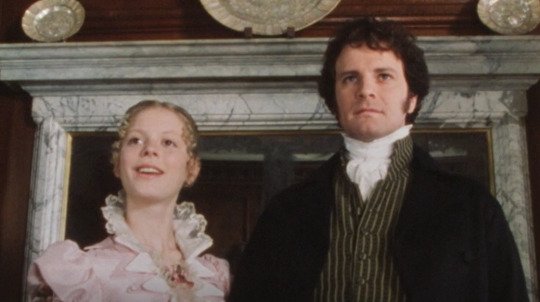
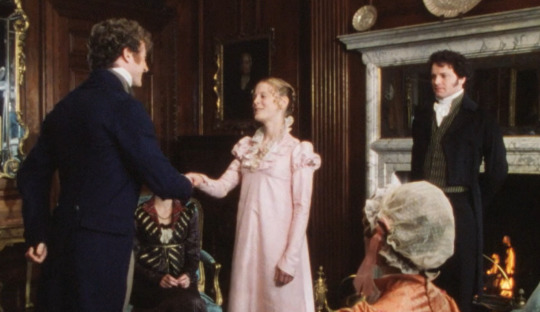
This is a really interesting moment, because it could be what happened in reality - but that's highly doubtful; Georgiana is far too confident here compared with what we see later in the story and it's very unlikely she'd be interested in a new suitor after what happened so recently with Wickham. Thus it's either Caroline playing up their meeting in her own mind, anticipating their courtship and marriage, or it's Elizabeth picturing what happened, fuelled by her own resentment of how Wickham was supposedly treated by the proud, selfish, unfeeling Darcys. So the first time we see Georgiana is deeply influenced by what two other very biased characters think they see.
The next moment is here:
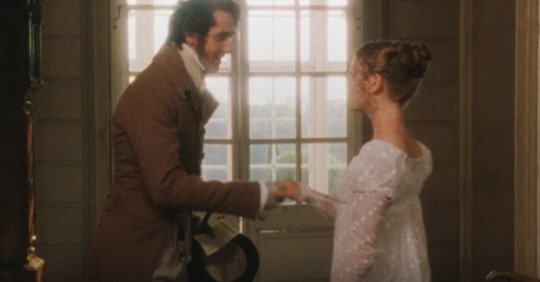
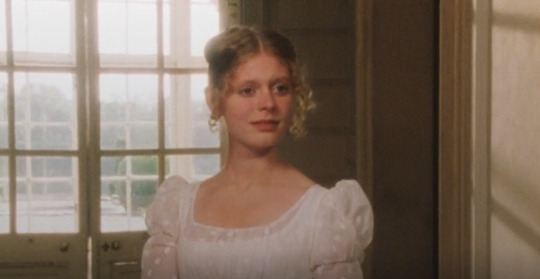
This time around Georgiana doesn't say a word or take the initiative; it's Wickham who takes her hand to kiss it, flirts excessively with her without saying a word, and strides off while she looks after him longingly, the beginnings of her smile fading as Darcy's handwriting takes over the screen. This is a rather biased moment as well; it's Darcy's flashback and he wasn't here for this bit, so he'd inevitably picture Georgiana as a sweet innocent completely swept off her feet by the charming man he so despises - but Darcy also knows his sister far better than Caroline and Elizabeth do, and she confesses everything to him once he discovers them at Ramsgate, so this is very likely how it went down in real life. And thus we get that much closer to the real Georgiana.
Finally, at the beginning of the fifth episode, we meet Georgiana in the flesh,
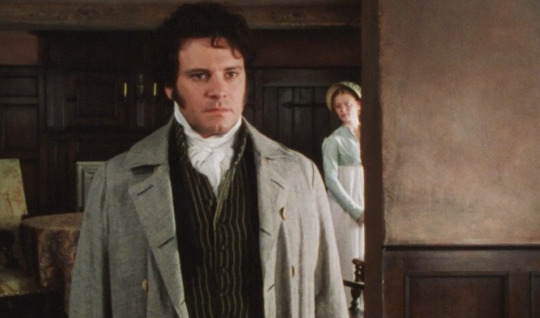
waiting nervously to be introduced,
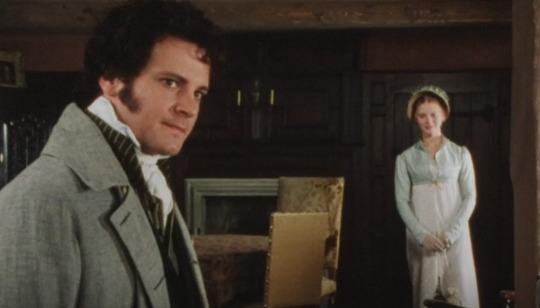
smiling as soon as Darcy steps aside,
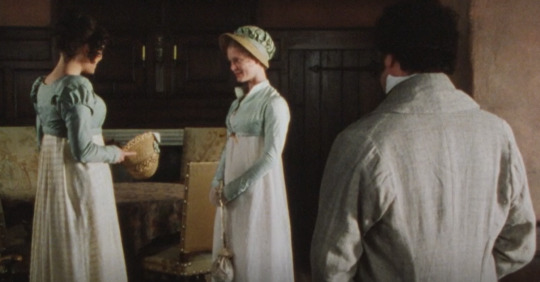
so nervous but so very pleased to meet Elizabeth,
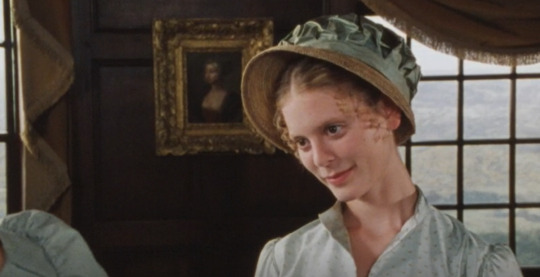
hesistant and selfconcious but very interested in learning more about Elizabeth, coming further out of her protective shell, full of love and praise for her brother, earnestly saying that she should have liked to have had a sister. And Elizabeth, like the audience, is charmed by the real Georgiana.
#bbc pride and prejudice#pride and prejudice#georgiana darcy#P&P#pride and prejudice bbc#jane austen#elizabeth bennet#fitzwilliam darcy#caroline bingley#charles bingley#george wickham#I really love analysing establishing character moments#Pride and prejudice 1995
527 notes
·
View notes
Text
I’ve seen a couple other posts talking about the warehouse scene recently so I’ve just gotta add my own thoughts bc I love how (manga especially) light genuinely looses his mind. I say manga especially bc the whole ending takes place there unlike in the anime, but you get long enough to see light actually suffering so much that his mental state breaks. He begs for takada and misa even though he (should) know he killed them/ removed them from the picture. He screams and wails and struggles to get up and ask ‘what is this?’ to the pain. He knows he cannot win- or at least he should- but he tries anyway as if Ryuk killing everyone there would save him from bleeding out anyway, alone, surrounded by corpses. Instead, he dies trapped alone inside his own broken head and body while people who once loved him watch him beg the empty air that hes scared to die.
#I love characters losing it#It’s a guilty pleasure#light yagami#death note#I usually prefer the anime but this particular part of the manga ending hits differently to analyse#near death note
195 notes
·
View notes
Text

When you meet that mini version of you don't you want to use them as a blunt force object to mow down your enemies? Yeah...TFOne Megatron too...
The Deceiver chapter 9-
https://archiveofourown.org/works/60638107/chapters/170827963
<Previous chapter art
#when a what if “tfone Megatron and Jack Darby meet up” becomes a multichapter series#This is why animation students shouldn’t be allowed to write#I can study the original animation too hard and pull character analyses out the wazoo#Oh look Soundwave chapter#The Deceiver au#funny#writing#dumb writing from work#ao3#transformers#transformers one#maccadam#bobbinfire#tf one#tf prime#transformers prime#megatron#tfone megatron#jack darby#tfone starscream#tfone soundwave#tfone x tfprime#my art#transformers fic#my comics#archive of our own
215 notes
·
View notes
Text
can we talk abt touya's medical trauma more please
#i just feel like its so...#brushed over#forgotten some might say#idk#i actually suck at writing out my thoughts and analysing characters#dabi#touya#pookie u never deserved that#hes on my mind a lot#can u tell#touya todoroki#mha#bnha#yeurrrl rambles#even as someone whos been in the hospital many times#i still cant turn my thoughts into words for this one#sighs#this may be completely self-indulgent#whatever
201 notes
·
View notes
Text
Two times Katsuki and Izuku analyzed a battle with the same conclusion. First was Ochako and her self-sacrificing strategy, now it's Shoto's quirk ability.




A subtle show of how much they mirror each other in their ambitions and mind, narratively speaking.
As an in-world explanation, aside from naturally thinking similarly to the other from long time exposure to each other, maybe it is from watching the same Hero media analyses (like videos, articles, discussions, forums etc.) because of their similar interests in All Might and heroes throughout their life too! This is just a HC tho!
#god i love this arc so fucking much#the Same Wording for a Battle analyses.#what a crazy fucking way to show characters mirroring each other. insaen. awesome.#i think they should bond over nerding out abt these more then make out abt it or smth.#shared interests over these is so cute to me yeah ehdnsmsk#evelynpr bnha#mha#my hero academia#bkdk#dkbk#bakudeku#dekubaku#izuku midoriya#bakugou katsuki
159 notes
·
View notes
Text
I really love the "Emily overcompensates" as an analysis in the series, and I think it flares up sometimes, mostly when she is letting them in on details about her past.
When Rossi is new and she casually admits her mum paid for her apartment through college because she was a crap waitress. It comes almost out of nowhere and to a person she has just met. When she admits she "did a lot of stuff" as a teen, she always uses this tone of voice that is trying to be nonchalant but reads as if she's still a teenager trying so hard to get accepted.
To overcompensate is all she learned growing up. To not would be falling below the mark as Elizabeth Prentiss' daughter. Teenagers naturally overcompensate, but the need for it gets exacerbated when you can't stay anywhere long enough for people to get to know you to settle down.
At least as Lauren she was a different person. Emily Prentiss wasn't being judged, she could sink into a role and let the Emily part of her do only the tactical thinking. But it comes so naturally to her when she joins the BAU. The scared teenager bubbling up because she's here to stay and these people she works with are going to have to get to know her, because God forbid the daughter of Elizabeth Prentiss get written down as a social faux pas and seen as cold and aloof. It's normal for your colleagues to get to know you over time, but Emily always sounds like it doesn't come quite naturally to her. She is seamless as a stranger, held together so well in conversations, but long term she mumbles personal details like she's the next teenager in a firing line.
#Emily Prentiss#Criminal Minds#aaron hotchner#David Rossi#Writing these analyses really helps me understand characters better for writing fics#and honestly theyre fun to write on their own#cm#bau team#Emily Prentiss needs a hug
231 notes
·
View notes
Text
I still think about my mutuals tag where he said that he thinks Johnny feels so much and so deeply that it literally drove him crazy. And yeah. Just think about it constantly. It's. The statement I associate with him. The first thing I think of when I think of him.
I really, really, really dislike when people paint Johnny as this totally unfeeling asshole. Or at least, I heavily disagree with it. That's not to say he isn't an asshole, he 100% is. He's a jerk to the people around him, and of course there really is no excuse for how he treats people. But explanations =/= excuses.
I feel when people try to paint him that way, it comes from a place that lacks understanding or even an unwillingness to understand. This goes hand in hand where I'll see these people call him an unfeeling asshole while using terms associated with cluster b disorders and using the social weight they carry to demonize him, a very prevalent problem reflected in society and internet pop psychology culture.
They'll take the fact he's a 'narcissistic junkie', and not only at the same time use it to demonize people with NPD, but also drug users. It's just a very lazy way to paint a picture of his characterization, by using loaded terms as a crutch and letting their social weight, using yours and others people's biases, do the job for you. Like man, if you're going to make a critique of his character can we at least actually put some effort behind it.
Like. They think he's a user who's an unfeeling asshole to people just for the sake of being one. They see him engaging in these self endangering, self harming, self sabotaging behaviors and brush it off as nothing more than him being like that simply because he likes it, that he relishes in it even. Simply because he wants and chooses to be like that.
They don't see him using as a way of numbing himself (this especially with the fact drugs are the first thing he goes for when Alt breaks it off with him). They don't see that constant toxic push and pull in his relationships as self sabotage. They don't see the fact him going on that OP was a suicide mission. Literally.
I truly believe he never intended to come back from that mission, evident in his last exchange with Kerry, evident in a LOT of his own lyrics. (Black Dog, Ballad of Buck Ravers.)
Johnny clearly is passionate. He clearly has things he cares about. He clearly feels.
I'd even go so far as to say he genuinely does care about the people in his life, he just simply doesn't know how to show it properly or in a way that's healthy for anyone involved. Even when Alt breaks up with him, and he pushes her away for it, he still ends up chasing after her before she's even left the venue. He still tries to protect her. When Alt gets abducted, and yeah, he's being a leadheaded stubborn idiot about it, he still goes after her.
And even if it's self aggrandizing in a lot of ways, he still cares about her life enough to raid a whole fucking tower for her. Even if it's more in the view of what Arasaka took from him, than what it did to her, he still cares about her in his own way. He still grieves her. He's still broken up when she dies right in front of him, and he still acts out even if it's violent and angry. His grief has ALWAYS manifested this way.
When he sees the headlines about Kerry, he asks V to check up on him, to visit him. He even asks Kerry about it because (I think) it came from a place of genuine worry shown the best way he can show it, a straightforward question and dropping it when he gets an answer, no matter how truthful the answer is. When Kerry gets the idea for a one time reunion, Johnny agrees to it because he thinks 'Kerry needs this'.
I also think people see that he's a very angry person and attribute 'unfeeling' to that. Because to them, to a lot of people, anger isn't a valid emotion nor one with as much value as happiness or sadness. That's it's something less than. Even if anger was all he felt, it's still a feeling. He still feels it. He still feels.
His anger, though it's execution is obviously a problem, it's extremely fucking justified and valid. It's born from the mistreatment of a system that only destroys people's lives. Born from a system that only knows how to take, how to hurt, how to kill.
The same system that took, not just a literal piece of Johnny, but so many pieces of his identity and his life that he literally tries to project himself as an entirely new person to escape this.
Johnny cares about how the system treats people, especially people like him. How it uses people and chews them up and discards them when it's taken all it can from them. Johnny cares so much he becomes not just a voice, but thinks he is- and in a lot of ways he does really become one- a symbol for people like him.
That OP functioned as another rescue mission for Alt, another statement for his ideals, and his blaze of glory to go out on his own terms.
Johnny cares about things. Johnny cares about people. He has feelings. Complicated, convoluted, deeply traumatized feelings. Feelings that are so intense, that it harms him. Feelings that are so intense, that it bleeds from him and harms others, too.
And honestly, I'd say the one and only person he stopped truly caring about was himself. A long, long time ago.
#theres also other words we can use other than calling him a narcissist guys cmon#hes self absorbed. self centered. selfish. self conceited even. like#lets try using actual character traits rather than generalizing and demonizing#actual disorders that ppl actually have irl and insinuating theyre less than for <3#just a thought!#this also isnt to say people dont have to like his character like dude i get it#hes *horrible* to people in his interpersonal relationships. i see that scene with alt and kerry and get so mad at him#i felt a literal pit in my stomach when i saw how he grabbed alts head and pulled her in and spit literal vitriol in her face#but he is a much more complex (even interesting) character than abusing cluster b terms and calling it a day#its lazy. youre gonna hate him put some effort in it man.#i honestly want to see honest critiques and analyses why people dislike his character thru n thru with no wiggle room like.#it for sure would make for interesting conversations#but if i see one more#'i hate him bc hes clearly a narcissist that doesnt care abt anyone but homself and hes a horrible despicable person for it'#i might actually lose my fucking mind#cyberpunk 2077#johnny silverhand#ult speaking#(*this isnt to say people have to like his character..#one day I'm fucking going to Tumblr hq n learning code j to make it so i can EDIT FUCKING TAGS ON MOBILE UGHRFKH)
155 notes
·
View notes
Text
Siuan & Moiraine: Love and Justice in The Wheel of Time
I've been thinking a lot about Siuan's final speech in third season finale of The Wheel of Time, and I disagree with the reading that it centred Moiraine, when it was about Siuan's sense of justice, and what the Light means to her. It was also very clear for the most of the season, little of what Siuan did actually involved Moiraine - they were broken up (in a sense) but still did what they had to do respectively.
"Will you stand behind this woman who stands for nothing? Who loves nothing but power?"
Ever since Elaida's introduction, we learn that she wants the throne for herself not because she cares about the world, or even the prophecy - she wants it to establish a powerful title equivalent to her rank and that was it. There is nothing behind her ambitions, which is the darkest thing of all - even worse than Melindhra who swore to the dark because she wanted to save Malkier.


Siuan is different. She never wanted to become Aes Sedai, much less the Amrylin Seat. She comes a little fishing village and wears her Tairen tattoos proudly for everyone to see; she uses fishing metaphors even in official capacity; she decorates her room like a fishing hut and doesn't care what others think. This is who Siuan's father taught her to be - never to be ashamed of her identity, and always to wear her pride on her sleeve.
"So much for the Amrylin Seat remaining neutral without favourites. No life. No love of one's own. Nothing but the Seat."
The necessity of the Amrylin's indifference is not who Siuan is, who loved her father and never wanted to leave him, who loved Moiraine so deeply that she continued their affair knowing that it ran the risk of death. She made a choice to love Moiraine when it wasn't safe to do so, because this love is what gives her life meaning. Thematically, Moiraine and Siuan's love for each other is inextricable from their pursuit of justice - they are fighting for a future they may not get to see, but to be happy while the world rots is not something they stood for.
This is where Siuan differs from Elaida; Siuan is a ruler who loves and is loved in return, and White Tower laws do not allow room for that. The intractability of the White Tower will cause them to lost the last battle. They want to cage and gentle Rand - with good reason, of course - but this decision also means that they don't have faith that Rand can choose to do the right thing. They don't trust anyone and don't stand for anything but themselves. Moiraine, despite her ruthlessness, has come to trust that somewhere in the Dragon Reborn lies a good-hearted shepherd named Rand al'Thor.
For Siuan, the Amrylin must stand for something and someone. She cannot lead the world with indifference and selfishness. Notice that Siuan wishes that they never went to Gitara's study. For Moiraine and Siuan, the thought of knowing the truth and eloping never crossed their minds - maybe if they hadn't walked into the room, they would have eloped. But they were given the burden of knowledge, and they cannot abandon the world. It is perhaps true that Moiraine and Siuan only fell in love with each other because they recognised in each other a fundamental goodness. As Anvaere has said of Moiraine, the same can be said of Siuan.
"But there are two things my sister understands better than anyone; the difference between right and wrong, and how much harder it is sometimes to do what is right."


So when Elaida accuses Siuan of working with Moiraine - knowing damn well that these two were lovebirds - Siuan tells the truth. She loves Moiraine, and she won't be shamed - the laws of the Aes Sedai need to leave room for choice, for love, and for light. If they are to win the Last Battle, they need to change. Elaida is using the ugliness of tower laws fuel her dictatorship, and Siuan saw right through it. Elaida isn't a dark friend, but she doesn't know what the light means. Siuan does, because she loves and is loved. Her declaration of love isn't about Moiraine as much as it is about the indifference and cruelty of Aes Sedais. But Moiraine and Siuan's love for each other is what sustained them; they had the slightest of hopes that winning the last battle is what gets them closer to their dreams. It is crushing and moving and deeply heartbreaking.

“Everyone has a choice and every choice has a consequence."
People fall in love. And when they do, they care about the future that they have to live in. To have "nothing but the seat" is what Elaida embodies, and in her final hours, Siuan is warning Elaida that this tyranny and narcissism will rot her soul. Elaida's countenance of shock and surprise affirms this. Unlike her, Siuan stood for someone and something. She has more than Elaida ever would hope to gain. Siuan will never become a tyrant because she loves. To discount Siuan's love for Moiraine is to overlook the choice she made to love against the grain, even when it is the most dangerous thing she could do. As Moiraine has said, every choice comes with a consequence. Both of them knew they were living on borrowed time, but that is what enriches the love they have for each other.
There is a future where Moiraine is waiting for Siuan, but ultimately it can't be because they made a choice to forge a future for the whole world, even if it means forfeiting their happiness. Even if it means they won't live to see it. There is an extremely moving and earth-shattering bravery in that commitment.
#siuan sanche#moiraine damodred#moiraine sedai#the wheel of time#wot on prime#wot#moiraine x siuan#siuan x moiraine#wheel of time#sophie okonedo#rosamund pike#i am only analysing show!siuan so forgive me if i get any character details wrong - i believe adaptations are distinct from the original#my meta#meta: the wheel of time
157 notes
·
View notes